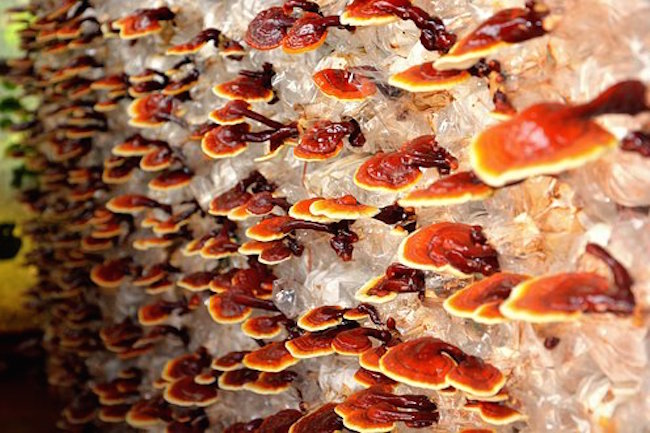Reishi mushrooms fight inflammation by Dr. Joseph Mercola for Mercola
While inflammation can be uncomfortable if not downright painful, it isn’t all bad. As part of your body’s immune response, it’s a biological defense mechanism that indicates your body is trying to throw off harmful stimuli and heal itself. Wounds and infections wouldn’t be able to heal without the inflammatory response.
People may not be aware that inflammation is at the heart of a number of seemingly unrelated diseases and disorders. Inflammation is involved in dermatitis, appendicitis, tonsillitis and bronchitis, among other types of conditions. Without addressing the cause of the inflammation, problems can trigger other diseases and health conditions, such as rheumatoid arthritis and cancer.1
Aging is another factor that’s so widespread, and one is so often present with the other, that scientists call it “inflammaging,”2 which is “chronic, low-grade inflammation.”3 According to one study:
“Increasing evidence indicates that inflamm-aging is intensively associated with many aging diseases, such as Alzheimer’s disease, atherosclerosis, heart disease, type II diabetes, and cancer.”4
But people who love mushrooms, particularly the reishi variety (Ganoderma lucidum), will be interested in knowing that not only do they possess certain properties that fight inflammation, but many age-related conditions as well. As explained in an NPR article:
” … even though the science on inflammation and disease is far from settled, tests and treatments are being promoted that claim to reduce that risk. That’s even though inflammation is also a force for good, protecting against infection and injury. Acute inflammation occurs when you sprain your ankle or get a paper cut. It’s part of the immune system’s box of tricks to spark a defense and promote healing.
But when that response is constantly triggered, over time it can damage the body instead of healing it. That’s what happens in autoimmune diseases like rheumatoid arthritis. And increasingly, inflammation has been implicated in more common chronic diseases, too, though its exact role hasn’t been nailed down.”5
How reishi mushrooms exert beneficial activity
According to a 2017 study, reishi mushrooms have been found to prevent lung cancer, one of the most common types in both men and women.6 Study authors noted that compounds in reishi modulate the function of the receptor tyrosine kinases, also known as RTKs:
“RTKs are transmembrane (glycoproteins) which are activated by external stimulus and stabilize the receptor dimerization producing downstream signals. RTKs are indulged in various cellular processes, advancing in cell proliferation, differentiation, and migration.
RTK family comprises of receptor for insulin growth factor, vascular endothelial growth factor (VEGF), epidermal growth factor (EGF), and nerve growth factor (NGF) … Importantly, non-RTKs also become an integral part of signaling cascade controlled by RTKs.”7
There are a number of other ways this occurs. One is due to ganoderic acid, a terpene in reishi mushrooms that slows the cell cycle and induces the “mitochondrial-dependent process of apoptosis”8 and enhances the immune system by prompting the expression of:
- Macrophages — “Antimicrobial warriors” that “play critical roles in immune regulation and wound-healing,” “respond to a variety of cellular signals and change their physiology in response to local cues”9
- Natural killer (NK) cells — Specific types of white blood cells that are “innate immune cells endowed with potent cytolytic activity against tumors, and meanwhile act as regulatory cells for the immune system”10
- T cells — T-lymphocytes are part of your immune system, with different roles such as “helpers” for your immune system. Cytotoxic T cells seek and destroy pathogens11 and may help fight cancer12
According to Integrative Cancer Therapies, reishi mushrooms have been used in Asian countries for several reasons relating to health and longevity:
“Ganoderma lucidum also suppressed cell adhesion and cell migration of highly invasive breast and prostate cancer cells, suggesting its potency to reduce tumor invasiveness. Thus, Ganoderma lucidum clearly demonstrates anticancer activity in experiments with cancer cells and has possible therapeutic potential as a dietary supplement for an alternative therapy for breast and prostate cancer.”13




